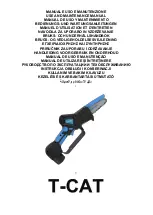
5
Additional Safety Warnings
Wear personal protective equipments. De-
pending on application, use face shield,
safety goggles or safety glasses for eye
protection. Wear hearing protectors, gloves
and workshop apron capable of stopping
small metal chips or workpiece fragments.
The eye protection must be capable of stop-
ping flying debris generated by various opera-
tions. The gloves, workshop apron and cloth-
ing must be fire resistant. Prolonged exposure
to high intensity noise may cause hearing
loss. Using protective equipments will reduce
the risk of personal injuries.
Do not handle workpiece without wearing
gloves. The sharp edge of workpiece may
cause a laceration hazard.
Ensure the switch is in the off position
before inserting battery pack. Inserting the
battery pack into power tools that have the
switch on invites accidents.
GFCI and personal protection devices like
electrician’s rubber gloves and footwear will
further enhance your personal safety.
Do not use AC only rated tools with a DC
power supply. While the tool may appear to
work, the electrical components of the AC
rated tool are likely to fail and create a hazard
to the operator.
Do not touch workpiece after it has just
been cut. Workpiece may be hot and lead to
burn hazard.
Keep bystanders a safe distance away
from work area. Anyone entering the work
area must wear personal protective equip-
ments (eye and ear protection, etc). Frag-
ments of workpiece or of a broken accessory
may fly away and cause injury beyond imme-
diate area of operation.
After finishing the cut, release the switch,
hold the saw steady and wait for blade to
stop before removing work or cutoff piece.
REACHING WITH YOUR HAND UNDER A
COASTING BLADE IS DANGEROUS!
Only use 5-3/8” metal cutting blades rec-
ommended in this manual. Do not use
abrasive wheels. Using blades not recom-
mended in this manual can result in a hazard-
ous situation.
Do not use dull blade. Additional sparks
generated by using dull blade increase the
risk of a fire hazard.
Do not use cutting oil. The use of cutting oil
may cause a fire.
Do not use tool near flammable material.
Sparks may cause fire.
area of the blade available for pinching that
leads to kickback.
Lower guard function
Check lower guard for proper closing be-
fore each use. Do not operate saw if lower
guard does not move freely and close in-
stantly. Never clamp or tie the lower guard
into the open position. If saw is accidentally
dropped, lower guard may be bent. Raise the
lower guard only with the lower guard lift lever
and make sure it moves freely and does not
touch the blade or any other part, in all angles
and depths of cut.
Check the operation of the lower guard
spring. If the guard and the spring are not
operating properly, they must be serviced
before use. Lower guard may operate slug-
gishly due to damaged parts, gummy depos-
its, or a buildup of debris.
Lower guard should be retracted manu-
ally only for special cuts such as “Plunge
Cuts” and “Compound Cuts”. Raise lower
guard by lower guard lift lever and as soon
as blade enters the material, lower guard
must be released. For all other sawing, the
lower guard should operate automatically.
Always observe that the lower guard is cov-
ering the blade before placing saw down
on bench or floor. An unprotected, coasting
blade will cause the saw to walk backwards,
cutting whatever is in its path. Be aware of the
time it takes for the blade to stop after switch
is released.
Do not run the tool while carrying it at your
side. Lower guard may be opened by a
contact with your clothing. Accidental con-
tact with the spinning saw blade could result in
serious personal injury.
Periodically remove the blade, clean the
upper, lower guards and the hub area. Wipe
it dry, or blow it clean with compressed air.
Preventive maintenance and properly operat-
ing guard will reduce the probability of an ac-
cident
Содержание CSM180
Страница 47: ...47 Notes Remarques Notas ...






































